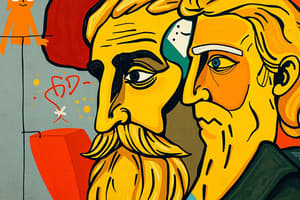Podcast
Questions and Answers
What does the term 'culture' specifically encompass?
What does the term 'culture' specifically encompass?
- Only language and religion of a group
- Only social habits and music
- Physical traits that distinguish individuals
- Characteristics and knowledge of a particular group of people (correct)
Which dimension of personality reflects an individual's adventurousness and creativity?
Which dimension of personality reflects an individual's adventurousness and creativity?
- Conscientiousness
- Openness (correct)
- Agreeableness
- Neuroticism
According to the Conflict Model proposed by Freud, what factor significantly influences adult personality?
According to the Conflict Model proposed by Freud, what factor significantly influences adult personality?
- Childhood events (correct)
- Cultural background
- Adult experiences only
- Genetic predisposition
Which personality dimension describes individuals who often experience mood swings and anxiety?
Which personality dimension describes individuals who often experience mood swings and anxiety?
Which model suggests that culture aids in self-realization?
Which model suggests that culture aids in self-realization?
What does the term 'self-construal' refer to?
What does the term 'self-construal' refer to?
What characteristic is associated with individuals high in agreeableness?
What characteristic is associated with individuals high in agreeableness?
The concept of consistency in the Consistency Model suggests what about individuals?
The concept of consistency in the Consistency Model suggests what about individuals?
What philosophical idea is Socrates known for emphasizing?
What philosophical idea is Socrates known for emphasizing?
According to Plato, what does the tripartite class structure of society correspond to?
According to Plato, what does the tripartite class structure of society correspond to?
What does Aristotle maintain about the relationship between the body and the soul?
What does Aristotle maintain about the relationship between the body and the soul?
What distinguishes Thomas Aquinas' view on self-knowledge?
What distinguishes Thomas Aquinas' view on self-knowledge?
What is the essence of Descartes' famous statement "I think, therefore I am"?
What is the essence of Descartes' famous statement "I think, therefore I am"?
David Hume's Bundle Theory suggests that the self is understood as what?
David Hume's Bundle Theory suggests that the self is understood as what?
According to Immanuel Kant, what are the two components of the self?
According to Immanuel Kant, what are the two components of the self?
What does John Locke propose as the basis for personal identity?
What does John Locke propose as the basis for personal identity?
Flashcards are hidden until you start studying
Study Notes
Ancient Philosophers
- Socrates: A classical Greek philosopher recognized as a founder of Western philosophy. Advocated for self-examination, famously stated, “Know Thyself” and emphasized that life is worthless without personal growth.
- Plato: Proposed that society mirrors the soul's tripartite structure: appetite, spirit, and reason. Introduced the concept of “The Ideal Self” and stated that self-knowledge is essential for true understanding.
- Aristotle: Defined the self as a combination of body and soul, asserting that they are inseparable entities.
Medieval Philosophers
- St. Augustine: Bishop of Hippo Regius in modern-day Algeria, utilized experience, reason, and language in exploring human nature.
- Thomas Aquinas: Developed a theory of self-knowledge dependent on personal experiences interacting with the surrounding world, countering the idea of isolated self-awareness.
Modern Philosophers
- Rene Descartes: Known as the “Father of Modern Philosophy,” he argued that consciousness resides in the mind, asserting “I think, therefore I am.”
- David Hume: Proposed the Bundle Theory of self, suggesting that the self is merely a collection of experiences and properties rather than a cohesive entity.
- Immanuel Kant: Introduced the concept of respect for self, identifying two aspects: the inner self and outer self. Noted that thoughts lacking content are empty.
- John Locke: Emphasized personal identity based on consciousness rather than physical substance or the soul, stating that identity is fundamentally linked to awareness.
The Self from Different Perspectives: The Anthropological View
- Anthropology: Examines the human experience, covering biological and cultural aspects.
- Culture: Encompasses distinct features of a social group, including language, religion, and arts; influences how personality develops.
- Self: Refers to unique characteristics, distinguishing individuals from one another.
- Personality: Encompasses individual thought patterns, feelings, and behaviors.
- Responsibility: The notion that individuals hold obligations based on their actions.
- Attitude: Represents how individuals evaluate and classify experiences.
Culture's Impact on Personality
- Scholars recognize the interaction between personality development and cultural context, leading to a need for cross-cultural psychological perspectives.
- The Big Five Personality Traits:
- Openness: High openness individuals are adventurous and creative.
- Conscientiousness: Associated with organization and attention to detail.
- Extroversion: Outgoing individuals thrive in social settings.
- Agreeableness: Cooperative individuals, while those low in agreeableness may be competitive or manipulative.
- Neuroticism: High levels are associated with mood instability and anxiety.
Culture and Theoretical Perspectives
- Conflict Model (Freud): Suggests childhood events significantly influence adult personality, where repressed traumatic experiences manifest in adulthood.
- Fulfillment Model (Humanistic): Proposed by Bronislaw Malinowski, this model suggests culture offers pathways for self-realization.
- Consistency Model (Cognitive): Focuses on individuals' preferences for coherence among their beliefs, opinions, and attitudes.
Culture and Concepts of Self
- Independent Construal of Self: Emphasizes personal attributes and internal qualities, often leading individuals to suppress their unique traits publicly while affirming them privately.
Studying That Suits You
Use AI to generate personalized quizzes and flashcards to suit your learning preferences.




